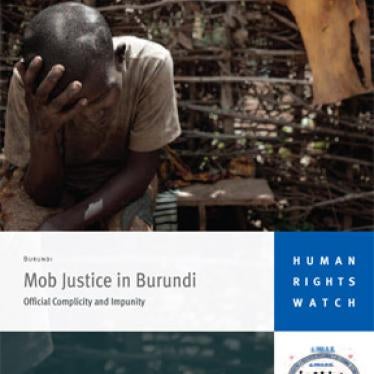(Bujumbura) - Mob attacks on suspected criminals in Burundi, often with official complicity, led to at least 75 killings in 2009, Human Rights Watch and the Association for the Protection of Human Rights and Detained Persons (APRODH) said in a report released today. The government of Burundi should end official involvement in "mob justice" and should hold perpetrators accountable, Human Rights Watch and APRODH said.
The 105-page report, "Mob Justice in Burundi: Official Complicity and Impunity," finds that authorities have at times been directly involved in public killings and beatings of suspected criminals, or have facilitated them by forming untrained "security committees" that operate at the margins of the law. In other cases, officials have stood by while mobs attacked alleged criminals. The report, based on seven months of field research, finds that such killings rarely result in official investigations, let alone prosecutions.
"Too many officials are turning a blind eye to mob justice, which is endemic in Burundi," said Georgette Gagnon, Africa director at Human Rights Watch. "But the state has a duty to keep its citizens safe, even if they're suspected of committing a crime."
The role of local officials ranged from direct involvement in mob violence to participating in cover-ups. In Buraza commune, a member of the local colline council allegedly participated in the mob beating to death of a suspected thief, Cyprien Habonimana, and the torture of his suspected accomplice. In Mutaho commune, a police chief told Human Rights Watch and APRODH that anyone who caught someone stealing from their fields at night could justifiably kill the suspect; this police chief refused to investigate such killings, even when the identities of ringleaders were widely known. In Kinyinya commune, administrative officials hid information from the police about the mob killing of two youths suspected of stealing a bicycle.
Few cases of mob violence led to investigations or arrests, and none had resulted in a conviction as of February 2010.
However, in some cases, police and administrative officials tried to stop mob violence, sometimes at great personal risk. In Giteranyi commune, for instance, a communal official attempted to transport a murder suspect to safety on his motorcycle through an angry crowd that he estimated at 2,000 people. The crowd threw stones at the official, who had to abandon his charge.
In Bujumbura, a suspected motorcycle thief who was saved by police from a mob attack told Human Rights Watch, "I wouldn't have got out of there alive if the police weren't there."
Nearly a quarter of the cases in the report came from the province of Ruyigi, site of 17 of the 75 mob justice killings documented in 2009. Other highly affected provinces were Ngozi, Bujumbura Mairie, Bujumbura Rural, Gitega, and Muyinga.
Human Rights Watch and APRODH found that the factors contributing to mob justice include lack of faith in the police and the judicial system, both impaired by corruption, incompetence, and inadequate resources. Many Burundians believe that any criminal suspect can bribe their way out of jail, rendering the official justice system irrelevant. These conditions give rise to serious human rights concerns.
"Burundians who are victims of crime expect neither protection from the police, nor justice from the courts. They often prefer to use force to protect themselves," said Pierre Claver Mbonimpa, president of APRODH. "To end mob justice, the government should take urgent steps to restore people's confidence in the police and the justice system."
Human Rights Watch and APRODH called on the government to end impunity for perpetrators of mob justice, who should be held to account like others responsible for serious crimes. The government should undertake a broad popular education campaign aimed at improving public understanding of the criminal justice system and discouraging mob justice. The government should also address the failings in the police and judicial system that contribute to such killings, the organizations said.







